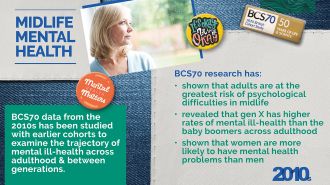
- Our studies
- Our research
- Publications and resources
- Data access and training
- About
- News
- Events
- Get in touch
- Join our mailing list

Welcome to our news and blogs section. Here you’ll find the latest developments and insights from across our longitudinal studies.
Data from the 1970 British Cohort Study (BCS70) Age 51 Sweep are now available to download from the UK Data Service.

Rates of obesity, high blood pressure and high cholesterol are lower among British adults in midlife compared to their counterparts in the US.

People who remain members of clubs and societies throughout their lives tend to have a higher daily step count and exercise more in their mid-40s.

Men are 34% more likely than women to be employed in top jobs at age 42 with overconfidence explaining up to 11% of the gender gap, on average, for full-time workers.

Up to one in five adults with a history of poor mental health reported they were ‘much worse off’ financially a year into the COVID-19 pandemic, compared to one in ten of those who had never had psychological problems in adulthood.

Inequalities in the early cognitive, social and emotional development of children in the UK, which are so important in shaping later life outcomes, have changed little between those born in the early 2000s and those born in the early 2010s. Researchers from the UCL Centre for Longitudinal Studies (CLS) and the Institute for Fiscal Studies […]

Only children can manage the emotional and psychological demands of caring just as well as those who share duties with siblings, according to UCL researchers.

Celebrating 50 years of the 1970 British Cohort Study – As our look back at the 1970 British Cohort Study through the 2010s draws to a close, let us whisk you away on a tour of the decade just gone by.

Information from the NHS about cohort members’ health care and treatment in hospitals has now been linked to two longitudinal cohort studies, which have collected survey data over six decades – the 1958 National Child Development Study (NCDS) and the 1970 British Cohort Study (BCS70).

The 1970 British Cohort Study (BCS70) has been an important source of evidence on midlife mental health, helping to improve our understanding about why middle age is such a vulnerable period for adults.

During the Age 42 Sweep, study participants were asked to repeat a vocabulary assessment they had previously taken in 1986, at age 16.

Baby Boomers and Generation X are at the greatest risk of mental ill-health in middle age, finds new research by UCL.

Britain’s birth cohort studies have been some of the leading sources of evidence on women’s education, employment and pay, helping us to monitor and understand the possible factors behind the gender wage gap.
Ryan Bradshaw
Senior Communications Officer
Phone: 020 7612 6516
Email: r.bradshaw@ucl.ac.uk